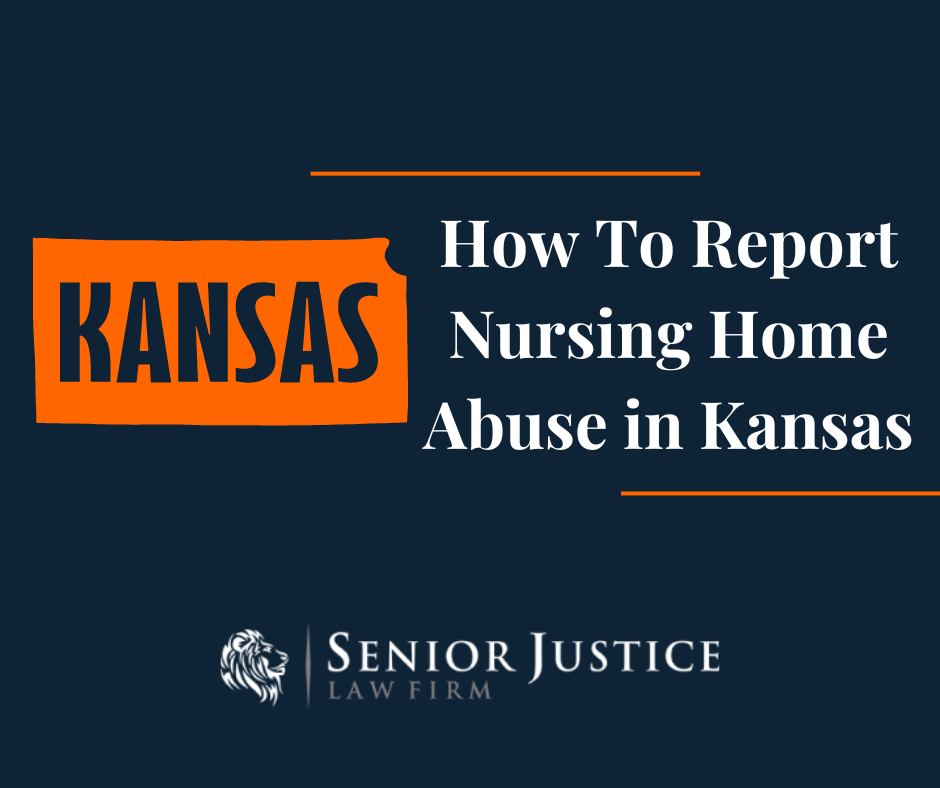So you’ve given a nursing home your trust when it comes to caring for your loved one. What do you do when they break that trust? If your loved one has been injured or even died because their nursing home failed to appropriately care for them, you should consider hiring a nursing home abuse attorney. An attorney can assist with conducting a thorough investigation to help your family receive answers. Additionally, in some cases, an attorney can help your family secure financial compensation. If you have questions about how to report nursing home abuse in Kansas, contact our experienced attorneys at Senior Justice Law Firm today.
Reporting Nursing Home Abuse in Kansas

There are three main laws that govern nursing home abuse or neglect in Kansas. These laws are:
- The Protection from Abuse Act. This Act grants judges the discretion to enact an emergency order that grants an elderly person any relief that will prevent them from suffering continued abuse.
- The Mentally Ill, Incapacitated and Dependent Persons/Social Welfare Act. This Act outlines the duty non-medical professionals have to report actual or suspected abuse to emergency agencies.
- The Report Abuse, Neglect or Exploitation of Adults Act. This Act mandates that any individual in the healthcare field who knows or suspects abuse within a nursing home must report the abuse to the appropriate authority. It also outlines penalties for failure to report.
If your loved one has been abused at their care facility, they may be eligible for financial compensation. There are several types of abuse that may need to be reported. These types of abuse include sexual, physical, emotional, and financial abuse.
Sexual Abuse
In Kansas, sexual abuse against those in a care home is defined as any sexual act with a resident to which the resident does not consent. Additionally, when the resident is incapable of resisting or declining due to disease, mental deficiency, or fear of retribution, they have been a victim of sexual abuse.
Physical Abuse
Physical abuse is an intentional bodily injury. Examples include pinching, slapping, choking, kicking, and shoving. It is also defined as unreasonable physical or chemical restraint.
Emotional Abuse
Emotional abuse in nursing homes refers to the infliction of mental pain, anguish, or distress through verbal or nonverbal acts. Examples can include behaviors such as yelling, threatening, humiliating, isolating, or ignoring the resident. Emotional abuse can be as damaging as physical abuse, as it can lead to depression, anxiety, and a severe decline in a resident’s mental health.
Financial Abuse
Financial abuse is defined as intentionally taking unfair advantage of an individual’s financial resources for personal gain. This type of abuse can also be sudden changes in billing practices, including errors, duplicate bills, and unexplained charges. Any theft of over $1,500 from an elderly individual is classed as a felony in Kansas.
How to Report Elder Abuse in Kansas
If you suspect that a loved one is experiencing neglect or abuse in a Kansas nursing home, there are several steps you can take to report nursing home negligence. Taking prompt action is crucial to safeguard the well-being of your family member. Options include:
- Nursing home administration. Start by reporting your concerns to the nursing home management. Every facility is required to have a procedure for handling complaints and allegations of abuse. Request a formal investigation and ask for the findings to be documented.
- Kansas Department for Aging and Disability Services (KDADS). If the response from the facility is not satisfactory, or if you prefer not to contact them directly, you can file a complaint with KDADS. They are responsible for regulating and overseeing nursing homes in Kansas and can be contacted via their hotline or website. KDADS conducts investigations into reports of abuse and ensures compliance with state regulations.
- Adult Protective Services (APS). Contact your local APS office for immediate intervention. APS protects vulnerable adults from abuse, neglect, or exploitation. They can investigate the situation and work with law enforcement if necessary to protect your loved one.
- Law enforcement. If you believe your loved one is in immediate danger, contact the police. They can provide immediate assistance and initiate a criminal investigation.
It’s important to document all communications and actions taken regarding your concerns. Keeping detailed records can support an investigation and any subsequent legal action. Remember, you are an important advocate for your loved one’s rights and well-being. By reporting suspected nursing home abuse, you might be able to prevent other residents from suffering similar harm.
Contact Senior Justice Law Firm for Help with Your Claim Today
Our attorneys at Senior Justice Law Firm focus on cases involving nursing home negligence. Helping victims of nursing home abuse and negligence is all we do. If your loved one has been injured or died while in the care of a nursing home, contact our nursing home abuse lawyers for a free consultation today. If you have not already done so, we can help you report nursing home abuse in Kansas and fight to bring you the justice your family deserves.

